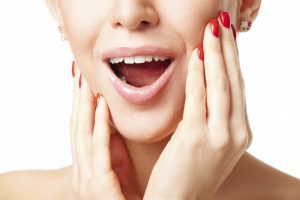Very often, patients present to our office complaining of TMJ while pointing to their joint area. TMJ is actually just an acronym for the temporomandibular joint, which everyone has. This joint is what connects your upper and lower jaws. And the muscles around the joint enable you to open and close your mouth.
The term Temporomandibular Joint Disorder or TMD is what you may have if you experience problems with your TMJ such as pain when opening or chewing, earaches, stiff and sore joint muscles or “lockjaw”. TMD can be the result of grinding or clenching of the teeth, facial trauma, arthritis, and misalignment of the teeth and of the upper and lower jaws.
Oftentimes, the discomfort associated with TMD can be alleviated with at home treatment such as
- Ice packs placed in the affected area or Biofreeze cold therapy gel or roller
- Heat packs
- Anti-inflammatory medications such as Ibuprofen
- Muscle relaxants
- Jaw massage and relaxation exercises
- Eating soft foods
It is best to avoid chewing gum, clenching the jaw, holding the phone between your ear and shoulder, and resting your hand or fist against the side of your face. All of these habits can irritate the jaw and neck muscles.
If the above treatments fail, your dentist might consider a nightguard if you clench or grind your teeth, braces to correct issues with your bite, or referral to a TMD/facial pain clinic. Let your dentist know of any TMJ issues you experience so they can determine the best course of treatment to get you out of pain and feeling better.








